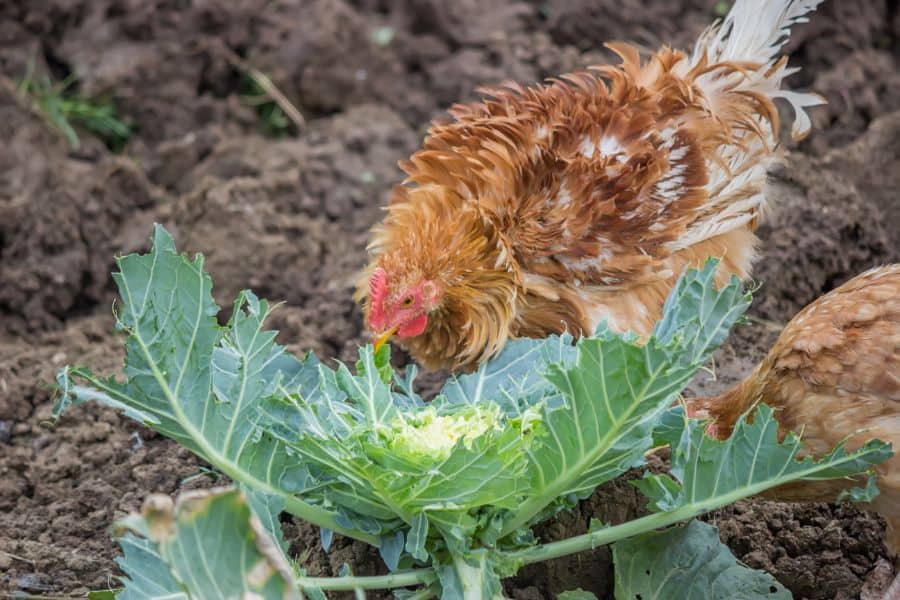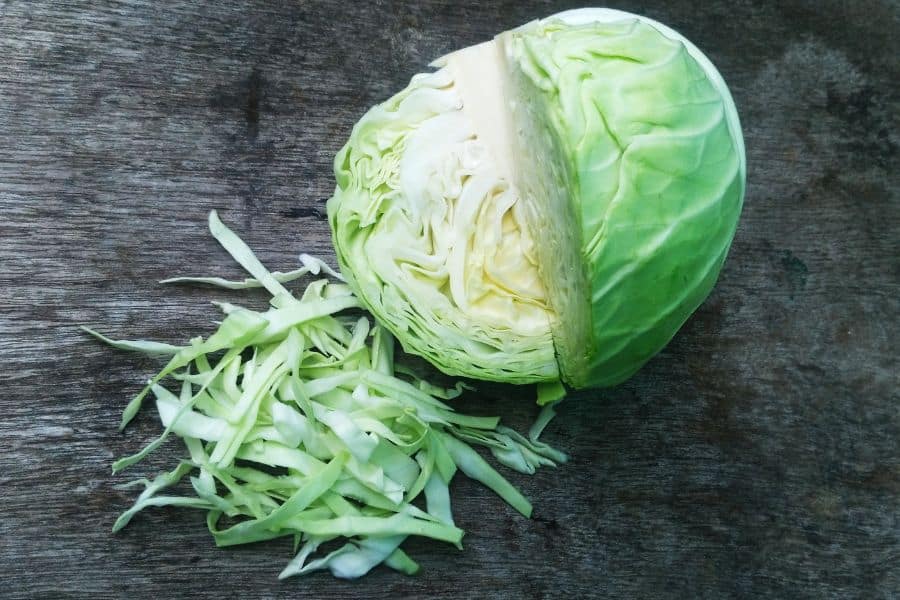There are hundreds and hundreds of vegetables you can feed your chickens.
But are all of them beneficial for the flock? Just because chickens are omnivores doesn’t mean every and single veggie should be on their menu, right?
So it’s useful to ask questions like, can chickens eat cabbage, broccoli, or peppers? You never know which of these harmlessly looking plants might turn out to be detrimental to the health of your flock.
Well, in today’s article, we won’t be talking about how you shouldn’t be feeding chicken cabbage because that is a healthy and nutritious snack with many benefits for chickens’ health.
But what are those benefits exactly? And is there such a thing as too much cabbage, aka does cabbage consumption at any point become harmful? We will be exploring these and many other questions in the lines ahead of us, so scroll down and join us!
What Is In a Cabbage?
Cabbage is a cruciferous vegetable meaning it comes from the same family as broccoli, cauliflower, kale, etc. It’s used in kitchens worldwide in raw and cooked forms.
100 grams of raw cabbage contains:
- 23 kcal calories,
- 92,50% water,
- 1,27 grams of protein,
- 5,5 grams of carbohydrates,
- 1,9 grams of fibers,
- 0,06 grams of total lipid (fat),
- 2,79 grams of sugar.
Like many vegetables, cabbage contains a lot of water, meaning it’s a great type of food to consume if you want to add extra fluid to the body. In fact, cabbage is amongst the vegetables with the highest water content in the world.
It, however, also means that there’s not much room for other macronutrients like proteins or fats. Still, probably no one is (or shouldn’t be) expecting cabbage to have a lot of macros. And it’s not like it’s a nothing burger – look at those carbs and fibers.
Anyone interested in human or chicken nutrition knows that vegetables and fruits are huge when it comes to micronutrients. And cabbage is a star in that department. Let’s look at some of them!
Vitamin C, also known as ascorbic acid, is needed to create collagen. Collagen is a type of protein that gives structure and flexibility to the skin. It is also essential for the proper functioning of bones, muscles, and blood vessels in chickens.
Vitamin K is a group of fat-soluble vitamins that play many important roles in the chicken’s body.
One of these vitamins is K1, which is found in abundance in cabbage. This nutrient acts as a cofactor for enzymes responsible for blood clotting. Without it, the blood would lose its ability to clot properly, increasing the risk of excessive bleeding.
Folate is a B vitamin essential for the production of red and white blood cells, their healthy growth, and their functioning.
Calcium – An eggshell is 90% calcium. This info alone should tell you how important calcium is for egg-laying chickens. Luckily for them, cabbage is rich in calcium. Besides helping the hens lay good quality eggs, calcium plays a vital role in bone health and development and in controlling muscle spasms.
Other nutrients found in cabbage worth mentioning are potassium, manganese, phosphorus, vitamin B6, and magnesium.
Is Cabbage Good For Chickens?
A food that has the nutritional profile we just outlined has to be good for chickens, right? Well, yes! Chickens can and should eat cabbage on a regular basis for the reasons we’ll specify in just a second.
Before that, we would like to remind you that cabbage is a treat, and treats should be around 10% of the chickens’ diet.
Cabbage Lowers Cholesterol In Chickens
Chickens with high cholesterol tend to have an increased risk of heart disease, especially when they have elevated levels of LDL cholesterol, which is a bad variety of cholesterol.
Cabbage contains two substances shown to reduce unhealthy LDL cholesterol levels: soluble fiber and plant sterols.
Soluble fiber has been shown to help lower LDL cholesterol levels. It does this by binding to cholesterol in the intestines and preventing its absorption into the blood.
On the other hand, plant sterols called phytosterols are plant compounds structurally similar to cholesterol. They reduce LDL cholesterol by blocking cholesterol absorption in the digestive tract.
Cabbage Protects Chickens From Free Radicals
Cabbage is rich in powerful antioxidants such as vitamin C, flavonoids, polyphenols, sulfur-containing amino acids, and phenolic acids.
Antioxidants serve as a bodyguard from the damage that is caused by free radicals.
Free radicals are actually molecules with an odd number of electrons, due to which they’re unstable. In case free radical levels get too high, they can harm chicken cells and cause a variety of health problems, such as cancer, heart disease, and vision loss.
Cabbage Is Good For Chickens’ Hydration
Any type of food that is this high in water amount should be on the menu for the chickens. Of course, they should be getting a huge chunk of their water needs from drinking water.
But, sometimes, they need that extra couple percent water intake which will make a huge difference for your chick. For example, think of the hot summers when chicks need a lot of water. In a situation like that, cabbage might be the best treat in the world, especially if it’s a cooled one.
Besides that, hydrated chickens are healthy chickens since water allows them to keep their body temperature at an optimum, helps reduce stress, and digest food, among other things.
Cabbage Is Good For Chickens’ Digestion
When it comes to having good digestion, fiber and water are quite important. We already mentioned how water aids this process, so it’s time to turn to fiber, of which these crunchy vegetables have a lot – almost 2 grams per 100 grams.
And they have both insoluble and soluble fiber. Insoluble fiber is a gut-friendly type of carbohydrate that can’t be broken down in the intestines. It helps keep the digestive system healthy by adding bulk to the stool and promoting regular bowel movements.
The soluble fiber, on the other hand, has been shown to increase the number of beneficial bacteria in the intestines. It happens due to the soluble fiber being the main source of fuel for friendly bacteria species like bifidobacteria and lactobacillus.
Can Chickens Eat Raw Cabbage?
Chickens can eat raw cabbage as there isn’t any part of the cabbage that should be removed before giving this nutritious veggie to the flock.
In fact, you should opt for raw cabbage if you’re interested in chickens getting the most out of the cabbage since its raw form has all the antioxidants and macronutrients we talked about in the previous section.
And don’t worry about the stem being too hard on chickens’ beaks – they will devour it in no time if they’re hungry!
Can Chickens Eat Cooked Cabbage?
So we alluded to this in the part we just discussed – cabbage in cooked form is less nutritionally dense than in raw form since some of the nutrition gets broken down during the cooking process.
However, this doesn’t mean that cooked cabbage is bad for chickens – your flock absolutely can eat it. If there’s some leftover stemmed cabbage in the house and no one feels like eating it, throw it out in the yard. The chicks will appreciate it.
What If You Feed Too Much Cabbage To Your Chickens?
When Buddha was preaching The Middle Path some 2,500 years ago, we doubt he was trying to warn chicken farmers not to feed too much cabbage or similar treats to their flocks.
But that shouldn’t stop us from taking his advice and not letting hens indulge too much in cabbage.
The number one reason to follow his words is something we already mentioned – cabbage is a snack and shouldn’t be given all the time.
The second reason’s got to do with goitrogens. Goitrogens are substances found in certain types of food, such as cruciferous vegetables and soybeans, which can interfere with the functioning of the thyroid gland.
Certain goitrogen compounds affect thyroid antibodies, while others interfere with thyroid peroxidase (TPO). TPO’s role is to provide sufficient iodine during thyroid hormone production. With such unfavorable compounds, the thyroid gland can’t produce enough hormones needed to regulate metabolism.
Goitrogens, in short, make it harder for the thyroid gland to produce hormones. What can this result in? Avian goiter, which is also known as thyroid hyperplasia – is a condition that can lead to an enlarged thyroid gland, weight loss, skin and feather abnormalities, etc.
Now, before you close this article and move to read about other healthy snacks you can feed chickens, we would like to inform you that cabbage can cause avian goiter only if you give it too much to them. So once again, follow the middle path. Also, you can reduce the goitrogen content in cabbage by cooking it!
Can Chickens Eat Cabbage Leaves?
Although humans usually don’t eat cabbage leaves because they’re too firm, chickens won’t have much, if any, trouble pecking away at them and can eat them.
Also, leaving out the leaves would mean leaving money on the table. When we say money, we actually mean nutrients – vitamins C, A, and fibers are all found in cabbage foliage.
What Age Can Chickens Eat Cabbage?
You shouldn’t be feeding cabbage to baby chicks that are younger than a month and a half since they’re very fragile and their digestive system isn’t yet fully developed.
Starter feed plus what their mom gives them will be enough during those first weeks. After that, you’re free to add it to their diet but only once in a while and small, chopped-up bits.
Can Chickens Eat Purple Cabbage?
Although we didn’t specify it anywhere, up until now, we were talking about green cabbage as that is the type of cabbage most widespread and used throughout the world. However, there’s another type of cabbage which is called purple or red cabbage.
Besides the obvious difference in color, purple and green cabbage slightly differ in taste since the green is sweeter.
But what’s more important is that purple cabbage is more nutritious than green in many categories. It has more calories, carbs, vitamin A, vitamin C, flavonoids, iron, etc. On the other hand, green cabbage edges out the purple one in the vitamin K department.
All this is to say that chickens can and definitely should eat purple or red cabbage due to its higher nutritional content.
Also Read:
Conclusion
To summarize, chickens can eat cabbage in raw and cooked form and in green and purple color since this cruciferous veggie is filled with water, fibers, and antioxidants.
Cabbage will lower your chicken’s cholesterol, keep it hydrated, and help with its digestive tract, to name a few of its benefits.
Keep in mind, though, that too high of a cabbage consumption is linked with avian goiter, and don’t give to the flock all the time.


